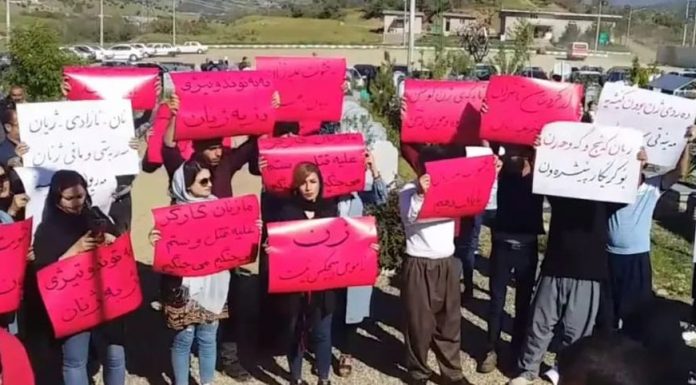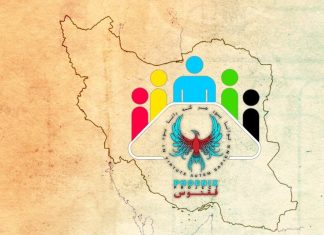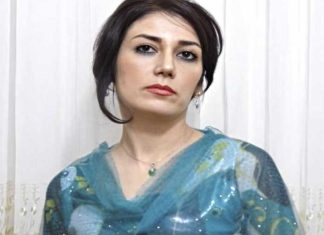A petition signed by 1,500 people in Iran asking the government to protect women from “honor killings” was sent on Dec. 16 to the UN special rapporteur on human rights in the Islamic Republic of Iran, Javaid Rehman.
The petition was published on Nov. 6 by the No To Taboo, No To Violence Against Women campaign. The campaign was launched on March 8 by human rights defenders living in Iran’s Kurdistan province, a region which is disproportionately affected by “honor killings.”
[aesop_image img=”https://kayhanlife.com/wp-content/uploads/2021/12/No-To-Taboo.jpg” panorama=”off” credit=”No To Taboo./KL” align=”center” lightbox=”off” captionsrc=”custom” captionposition=”left” revealfx=”off” overlay_revealfx=”off”]
So-called honor killings take place when a girl or a woman is murdered by a male member of her family. The perpetrators claim that the murders are justified because the victim’s actions or behavior are thought to have brought shame or ‘dishonor’ on the family.
Referring to Kurdistan, the petition said: “We must not allow patriarchy, honor-worship, and inhuman traditions to take more lives of young women and girls. We, the signatories, stand up against ‘honor killings’ committed against women and work in every possible way to end these crimes.” The petition was also sent to leaders in the US, UK, Australia, Ireland and New Zealand.
Signatories of the petition included: women’s rights activists Somieh Rezaei, Sohila Heidari and Negar Soltani; civil society activists Amir Tehrani, Amir Hossein Azizi and child rights activist Parvin Azad; and former political prisoners Ahmad Alinejad, Babak Safari and Hossein Gholami Azar.
Speaking to Kayhan Life, Azizeh Lotfi, a human rights defender based in Finland and a founding member of the campaign, said: “We hope that people around the world will show their support for women exposed to this life-threatening cultural norm. We want to unite women to defend their rights and entitlements and to educate society about the importance of gender equality.”
The campaign is run by a team predominantly based in Iran which prefers to remain anonymous given the Iranian government’s ongoing crackdown on human rights campaigners.
At least 400 women in Iran are killed every year by male family members as a result of “honor killings,” according to the Middle East Institute, a Washington-based think tank. The rise in gender-based violence in Iran in recent years has sparked international concern.
A statement made by Rehman to the UN Human Rights Council on March 4 asked Iran’s government to repeal all legislation which exonerated or mitigated the murder of girls and women in so-called honor killings.
“Honor killings” in Iran caused a global outcry in May 2020 after international media outlets reported on the murder of 14-year-old Romina Ashrafi, who was beheaded by her father with a sickle. Romina had run away from home to marry her boyfriend against her father’s wishes. The murder was acknowledged by Iran’s Supreme Leader Ayatollah Ali Khamenei, who tweeted that there should be a “harsh confrontation” with men “who consider the violation of women their right.”
However, laws in Iran which enable or mitigate “honor killings” remain in place. Under article 630 of the Islamic Penal Code in Iran, a husband who witnesses his wife committing adultery can kill his wife as well as the man participating in the adultery. There is no such law for wives who witness their husbands having sexual intercourse with other women.
In addition, fathers and paternal grandfathers who kill their children are not considered to be murderers under Iran’s Sharia laws and are not subjected to the death penalty.
A draft bill to tackle violence against women in Iran was approved by Iran’s parliament (Majlis) in January, but it has yet to be ratified. The protection, dignity and security of the women against violence bill established a legal definition for violence against women and required Iran’s judiciary to take educational courses on gender-based violence and provide appropriate support for victims.
“Despite worldwide media attention on ‘honor killings’ in Iran, nothing changes: women are still being placed in situations where male members of the family can kill them,” said Shiva Mahbobi, a London-based human rights defender and spokesperson for the Campaign to Free Political Prisoners in Iran (CFPPI) supporting the No To Taboo, No To Violence Against Women campaign.
“Laws in Iran which allow and enable honor killings by men within the family is a large part of the problem. This is why the campaign has launched this petition,” She said in an interview with Kayhan Life.
Mahbobi — who was asked by the campaign’s team to share the petition with Rehman and state leaders — said the petition would be sent to the office of Iran’s President Ebrahim Raisi in the coming days. The campaign is now preparing a second petition for people outside Iran to sign.
“The cases that are reported are the ones that we know about, but a lot of the time we don’t hear about these killings. This is because there is no law to investigate ‘honor killings’ in Iran,” Mahbobi said. “The campaign needs to attract international organizations to put pressure on the regime.”
A report published on Dec. 16 by Norway-based NGO Iran Human Rights (IHR) — titled “Iran Human Rights Defenders 2021” — lists more than 100 human rights campaigners being targeted by Iranian authorities for their peaceful activism. Of those, 11 are women advocating for gender equality in the country.
The IHR report asked the Iranian government to agree to several recommendations including to cooperate with the UN’s special rapporteur on human rights in Iran, and to allow him to visit Iran. The report also urged the international community to put discussions about human rights defenders on the agenda at all bilateral and multilateral talks with Iranian authorities.






